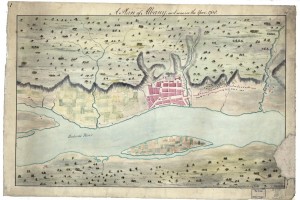On Thursday, August 14, 2014, the Journal of the American Revolution posted "The American Revolution Comes to Albany, New York, 1756-1776." This article began as a conference paper, which came out of my dissertation. The Albanians' experiences with quartering will appear in much more detail in my future book AMERICA'S FIRST GATEWAY. I wrote "The American Revolution Comes to Albany" not only to share this great story with a wider audience, but also to experiment with how an historian could re-purpose their conference papers into other formats. I incorporated some of the feedback I received on my conference paper and added a bit of explanation for a non-specialist audience to this piece.
At some point I may repurpose the story of how Albany became revolutionary for an academic article--although I also like the idea about an article on loyalism in Albany.
The American Revolution Comes to Albany, New York, 1756-1776
"The history of the present King of Great Britain is a history of repeated injuries and usurpations, all having in direct object the establishment of an absolute tyranny over these states. To prove this, let facts be submitted to a candid world…He has combined with others to subject us to a jurisdiction foreign to our constitution, and unacknowledged by our laws; giving his assent to their acts of pretended legislation: For quartering large bodies of armed troops among us.”–Declaration of Independence
On June 11, 1776, the Second Continental Congress appointed its Committee of Five to draft a declaration of independence from Great Britain. Thomas Jefferson, Benjamin Franklin, John Adams, Roger Sherman, and Robert R. Livingston composed a document that proclaimed why the thirteen colonies had no other recourse but to separate from the British Empire. They declared that “The history of the present King of Great Britain [George III] is a history of repeated injuries and usurpations all having in direct object the establishment of an absolute tyranny over these states.” The committee added weight to the colonists’ claims by providing a long list of specific examples of the king’s injustices towards them. Among the enumerated grievances: King George III had given his “assent” “For Quartering large bodies of armed troops among us.”
The colonists experienced the king’s unjust quartering throughout the French and Indian War (1754-1763). It all started when John Campbell, Earl of Loudoun assumed command of the British forces in 1755. Loudoun lamented how the British soldiers had lost the 1755 campaign to the French because his predecessor William Shirley could not find winter quarters for them near the front lines. Loudoun sought to rectify this situation by ordering the governors of Massachusetts, New York, and Pennsylvania to erect barracks in Boston, New York City, Albany, and Philadelphia. The governors either refused or informed Loudoun that their colonial assembly would provide only some of the funds needed to build barracks or rent rooms in inns and public houses within those cities. Eventually, each city built at least some of the barracks Loudoun had demanded, but only in Albany, New York did Loudoun resort to forcibly quartering his troops in private homes.

